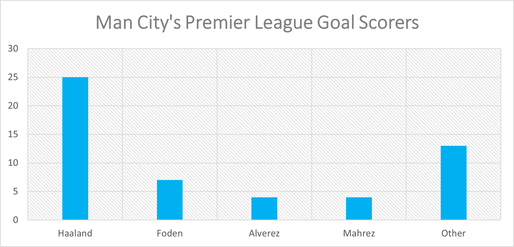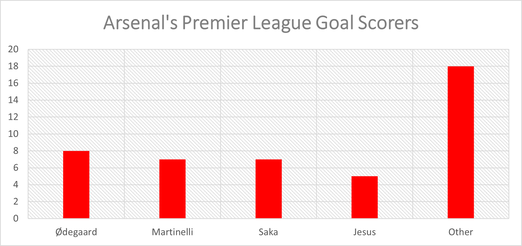Diversification is a topic which is brought up frequently in economics. Investors often advocate diversifying portfolios to protect themselves against shocks to certain industries. Put more simply, this means it’s wise not to put all your eggs in one basket. Last weekend, I found myself wondering was this a mistake that Pep Guardiola has made.
Manchester City have acquired probably the best out-and-out centre forward in the world. Maybe Erling Haaland hasn’t got the most well-rounded game in terms of dribbling and skill, but he is undeniably a phenomenal goal scorer. The Norwegian now has 25 Premier League goals after just 19 appearances. Meaning he is averaging 1.32 goals a game and quite good at football. Despite this amazing stat, Man City are worse off this year than they were last year.
After 20 matches last year Guardiola’s men sat at the top of the table with 50 points. This year after the same number of matches they find themselves in 2nd place with just 45 points. Meaning they are 5 points behind the league leaders Arsenal who have played a game less.
How have they managed that?
As a boyhood Arsenal fan, I would love to think this is all because of Mikel Arteta and Arsenal. However, considering Arsenal are yet to play Manchester City this can hardly be the case. I think the answer could be the transition of Man City from a team with a lot of goal scorers, to a team with one player who can score a lot of goals. The below graph illustrates the latter.
During the 2017/18 season Pep’s men became the first ever Premier League centurions. They managed to accumulate 100 points in one season. That season Manchester City’s highest scorer finished 11 goals behind the Golden Boot winner. The reason this didn’t matter was because 4 different players for City all scored 10 goals or more. If an opponent could stop Aguero, then Sterling, Jesus and Sane could step in. This doesn’t seem to be the case for Man City anymore.
Furthermore, a different club have now adopted this strategy to great success. Arsenal are currently top of the Premier League and have the second most goals in the competition (45). Amazingly, none of their players have scored more than 8 goals. This is one of the key reasons the Gunners have coped so well with the injury to Gabriel Jesus. He is responsible for just over 11% of their total goal tally. Take him out of the team and Saka, Martinelli, Ødegaard and Nketia are all still there. The graph below illustrates this.
What’s more is that Arsenal’s group orientated approach to goal scoring provides the team with multiple outlets when playing. Whereas at Man City every player that isn’t Erling Haaland seems to have one job, assist Erling Haaland. The halfway mark in this Premier League season seems to demonstrate that you don’t necessarily need to have the best players to be top of the league. All you need is for your team to be greater than the sum of its parts.


 RSS Feed
RSS Feed